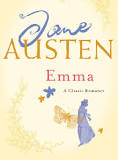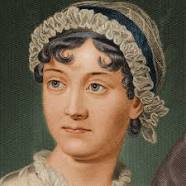Emma Page #3
Emma, by Jane Austen, is a novel about youthful hubris and the perils of misconstrued romance. The story takes place in the fictional village of Highbury and the surrounding estates of Hartfield, Randalls, and Donwell Abbey and involves the relationships among individuals in those locations consisting of "3 or 4 families in a country village". The novel was first published in December 1815 while the author was alive, with its title page listing a publication date of 1816. As in her other novels, Austen explores the concerns and difficulties of genteel women living in Georgian–Regency England; she also creates a lively comedy of manners among her characters and depicts issues of marriage, gender, age, and social status.
“Ever since the day--about four years ago--that Miss Taylor and I met with him in Broadway Lane, when, because it began to drizzle, he darted away with so much gallantry, and borrowed two umbrellas for us from Farmer Mitchell's, I made up my mind on the subject. I planned the match from that hour; and when such success has blessed me in this instance, dear papa, you cannot think that I shall leave off match-making.” “I do not understand what you mean by 'success,'” said Mr. Knightley. “Success supposes endeavour. Your time has been properly and delicately spent, if you have been endeavouring for the last four years to bring about this marriage. A worthy employment for a young lady's mind! But if, which I rather imagine, your making the match, as you call it, means only your planning it, your saying to yourself one idle day, 'I think it would be a very good thing for Miss Taylor if Mr. Weston were to marry her,' and saying it again to yourself every now and then afterwards, why do you talk of success? Where is your merit? What are you proud of? You made a lucky guess; and that is all that can be said.” “And have you never known the pleasure and triumph of a lucky guess?--I pity you.--I thought you cleverer--for, depend upon it a lucky guess is never merely luck. There is always some talent in it. And as to my poor word 'success,' which you quarrel with, I do not know that I am so entirely without any claim to it. You have drawn two pretty pictures; but I think there may be a third--a something between the do-nothing and the do-all. If I had not promoted Mr. Weston's visits here, and given many little encouragements, and smoothed many little matters, it might not have come to any thing after all. I think you must know Hartfield enough to comprehend that.” “A straightforward, open-hearted man like Weston, and a rational, unaffected woman like Miss Taylor, may be safely left to manage their own concerns. You are more likely to have done harm to yourself, than good to them, by interference.” “Emma never thinks of herself, if she can do good to others,” rejoined Mr. Woodhouse, understanding but in part. “But, my dear, pray do not make any more matches; they are silly things, and break up one's family circle grievously.” “Only one more, papa; only for Mr. Elton. Poor Mr. Elton! You like Mr. Elton, papa,--I must look about for a wife for him. There is nobody in Highbury who deserves him--and he has been here a whole year, and has fitted up his house so comfortably, that it would be a shame to have him single any longer--and I thought when he was joining their hands to-day, he looked so very much as if he would like to have the same kind office done for him! I think very well of Mr. Elton, and this is the only way I have of doing him a service.” “Mr. Elton is a very pretty young man, to be sure, and a very good young man, and I have a great regard for him. But if you want to shew him any attention, my dear, ask him to come and dine with us some day. That will be a much better thing. I dare say Mr. Knightley will be so kind as to meet him.” “With a great deal of pleasure, sir, at any time,” said Mr. Knightley, laughing, “and I agree with you entirely, that it will be a much better thing. Invite him to dinner, Emma, and help him to the best of the fish and the chicken, but leave him to chuse his own wife. Depend upon it, a man of six or seven-and-twenty can take care of himself.” CHAPTER II Mr. Weston was a native of Highbury, and born of a respectable family, which for the last two or three generations had been rising into gentility and property. He had received a good education, but, on succeeding early in life to a small independence, had become indisposed for any of the more homely pursuits in which his brothers were engaged, and had satisfied an active, cheerful mind and social temper by entering into the militia of his county, then embodied. Captain Weston was a general favourite; and when the chances of his military life had introduced him to Miss Churchill, of a great Yorkshire family, and Miss Churchill fell in love with him, nobody was surprized, except her brother and his wife, who had never seen him, and who were full of pride and importance, which the connexion would offend. Miss Churchill, however, being of age, and with the full command of her fortune--though her fortune bore no proportion to the family-estate--was not to be dissuaded from the marriage, and it took place, to the infinite mortification of Mr. and Mrs. Churchill, who threw her off with due decorum. It was an unsuitable connexion, and did not produce much happiness. Mrs. Weston ought to have found more in it, for she had a husband whose warm heart and sweet temper made him think every thing due to her in return for the great goodness of being in love with him; but though she had one sort of spirit, she had not the best. She had resolution enough to pursue her own will in spite of her brother, but not enough to refrain from unreasonable regrets at that brother's unreasonable anger, nor from missing the luxuries of her former home. They lived beyond their income, but still it was nothing in comparison of Enscombe: she did not cease to love her husband, but she wanted at once to be the wife of Captain Weston, and Miss Churchill of Enscombe. Captain Weston, who had been considered, especially by the Churchills, as making such an amazing match, was proved to have much the worst of the bargain; for when his wife died, after a three years' marriage, he was rather a poorer man than at first, and with a child to maintain. From the expense of the child, however, he was soon relieved. The boy had, with the additional softening claim of a lingering illness of his mother's, been the means of a sort of reconciliation; and Mr. and Mrs. Churchill, having no children of their own, nor any other young creature of equal kindred to care for, offered to take the whole charge of the little Frank soon after her decease. Some scruples and some reluctance the widower-father may be supposed to have felt; but as they were overcome by other considerations, the child was given up to the care and the wealth of the Churchills, and he had only his own comfort to seek, and his own situation to improve as he could. A complete change of life became desirable. He quitted the militia and engaged in trade, having brothers already established in a good way in London, which afforded him a favourable opening. It was a concern which brought just employment enough. He had still a small house in Highbury, where most of his leisure days were spent; and between useful occupation and the pleasures of society, the next eighteen or twenty years of his life passed cheerfully away. He had, by that time, realised an easy competence--enough to secure the purchase of a little estate adjoining Highbury, which he had always longed for--enough to marry a woman as portionless even as Miss Taylor, and to live according to the wishes of his own friendly and social disposition.
Translation
Translate and read this book in other languages:
Select another language:
- - Select -
- 简体中文 (Chinese - Simplified)
- 繁體中文 (Chinese - Traditional)
- Español (Spanish)
- Esperanto (Esperanto)
- 日本語 (Japanese)
- Português (Portuguese)
- Deutsch (German)
- العربية (Arabic)
- Français (French)
- Русский (Russian)
- ಕನ್ನಡ (Kannada)
- 한국어 (Korean)
- עברית (Hebrew)
- Gaeilge (Irish)
- Українська (Ukrainian)
- اردو (Urdu)
- Magyar (Hungarian)
- मानक हिन्दी (Hindi)
- Indonesia (Indonesian)
- Italiano (Italian)
- தமிழ் (Tamil)
- Türkçe (Turkish)
- తెలుగు (Telugu)
- ภาษาไทย (Thai)
- Tiếng Việt (Vietnamese)
- Čeština (Czech)
- Polski (Polish)
- Bahasa Indonesia (Indonesian)
- Românește (Romanian)
- Nederlands (Dutch)
- Ελληνικά (Greek)
- Latinum (Latin)
- Svenska (Swedish)
- Dansk (Danish)
- Suomi (Finnish)
- فارسی (Persian)
- ייִדיש (Yiddish)
- հայերեն (Armenian)
- Norsk (Norwegian)
- English (English)
Citation
Use the citation below to add this book to your bibliography:
Style:MLAChicagoAPA
"Emma Books." Literature.com. STANDS4 LLC, 2025. Web. 22 Feb. 2025. <https://www.literature.com/book/emma_29>.








Discuss this Emma book with the community:
Report Comment
We're doing our best to make sure our content is useful, accurate and safe.
If by any chance you spot an inappropriate comment while navigating through our website please use this form to let us know, and we'll take care of it shortly.
Attachment
You need to be logged in to favorite.
Log In